Now, who wants to talk about eCommerce this evening?
Well, of course, you do. Why else should you be here?
And talking about eCommerce, the biggest thing in retail right now is not wasting time, period! Besides general knowledge, it can give you an idea about the market and the industry at large. In the future, if you wish to start up, this knowledge will prove to be your backbone.
Enough blabbering! Let’s get on with some eCommerce talk now.
eCommerce has grown tremendously over the last ten years and at such a high speed!
Just 20 years back, in the 2000s, it accounted for only, and I repeat, only 1% of the total retail sales in the US. In the 2010s, the number climbed to 7.2%, but in 2019, it reached a whopping 16%, more than double.
But, wait, there’s something even more magical than this. The online share of retail sales in the US rose to 21.3% in 2020. The revenue from total eCommerce sales in the US increased to $759.4 billion in 2020 from $576.5 billion in 2019. That’s it! A massive increase, that too in such stressful conditions!
Take a look at some of the revenue predictions for the eCommerce industry in the US for the next four years:
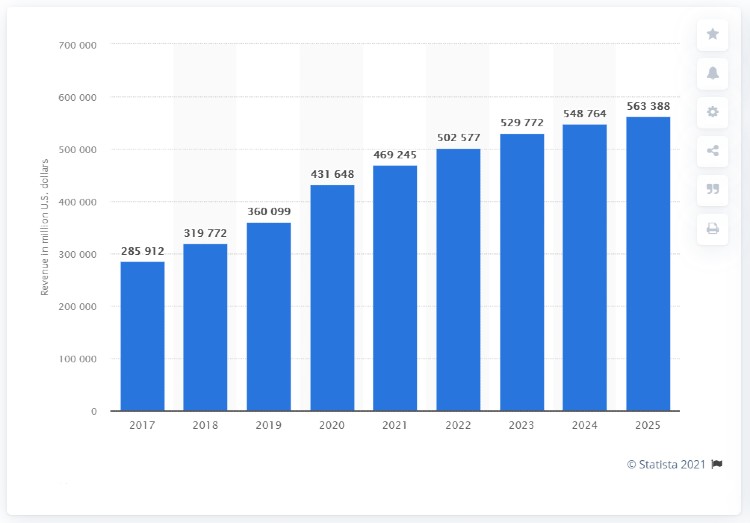
Now you see why knowing about eCommerce and the companies that have transformed the word ‘retail’ itself is so important? Right. So, keep scrolling!
What is the reason for this massive growth of eCommerce companies?
Well, if you ask about 2020, it is clear as ice.
People had nothing to do sitting at their homes, so they shopped. And as almost all the brick and mortars were closed, the only source of shopping was online. Last year, a total amount of $861.12 billion was spent by locked-down consumers in shopping online. It is said to be the biggest jump in the history of online retail annual spending.
But it is not only for the pandemic that the eCommerce industry has witnessed such rapid growth in the last few years. Some of the biggest eCommerce companies have been leading the online retail sector for years now. The main reasons for the industry’s popularity are as follow:
Cross-channel marketing
Nowadays, brands promote their products/services on multiple social media channels to increase visibility. In a survey for Facebook, 81% of customers said that Instagram helped them research a brand’s product/services before buying. Another 83% revealed that it helped them find new products/services. The brands also interact with the customers regularly through various tools on social media, send email newsletters, text messages, and even advertise on the search engines. Some physical stores also go the extra mile to promote their online endeavors to the loyal customer base, encouraging them to shop online. Such friendly and omnichannel promotion is one of the biggest reasons for the popularity of eCommerce in the current times.
Smartphone Adaptivity
With an increase in the number of smartphone users in the world, eCommerce sales have been steadily rising. Today’s brands keep mobile friendliness at the top of their priority list while developing their websites. As a result, almost every modern eCommerce company has a mobile app for their smartphone users to gain better access to their products/services and shop seamlessly. Refer to the following image for a better understanding of the rise in mobile commerce.
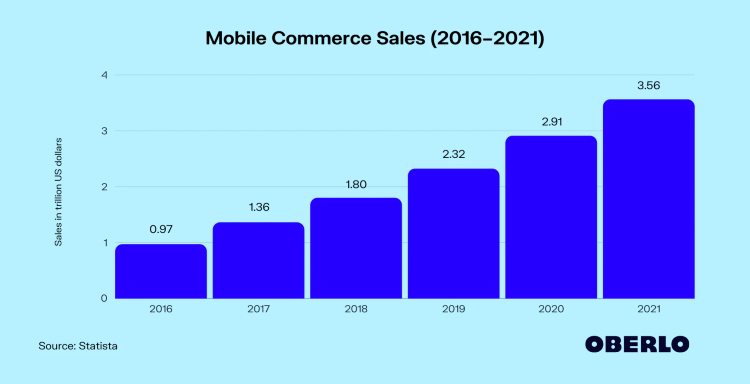
Increased urbanization
Take a look at the state of urbanization in the US in 2The statistic illustrates the urbanization of each continent by 2020. The degree of urbanization worldwide was around 56 percent in mid-2020.
As you can see, the US tops the list of the most urbanized countries in the world. This increase in urbanization is directly proportional to the rise in eCommerce sales, as it reduces the logistics challenges faced by the eCommerce giants. With more people flocking to the urban centers for jobs, these companies will have no dearth of employees to deliver their goods and services on time and keep their online customers satisfied.
Massive customization
Online shopping comes with the in-built benefits of tailored experiences. Nowadays, customization is at its peak, all thanks to eCommerce. Further, various tools on the internet tap into customers’ purchase histories and shopping preferences to come up with relevant recommendations for future purchases. Be it fashion, home decor, or utility services, you can get these recommendations everywhere when you browse. This bespoke customer experience is one of the prominent reasons for the rise in eCommerce sales.
For example, if you buy a bedsheet, you will get recommendations on cushion covers that match the color or pattern of the bedsheet you have bought. If you do not need those, you may avoid them and move on. But say if you had forgotten to buy those covers and you actually needed them, these recommendations can help you make the best choice.
Incredible stocks
Most of the popular online stores are like this never-ending treasure trove of goods/services. The stocks are almost always full, and even if they are not, you will get notified whenever they are. Not all brick and mortar stores offer that benefit let alone driving to the store every day to find out if your desired product is available. So yes, online is the answer. Here is a glimpse of the largest eCommerce stocks in 2020 below:
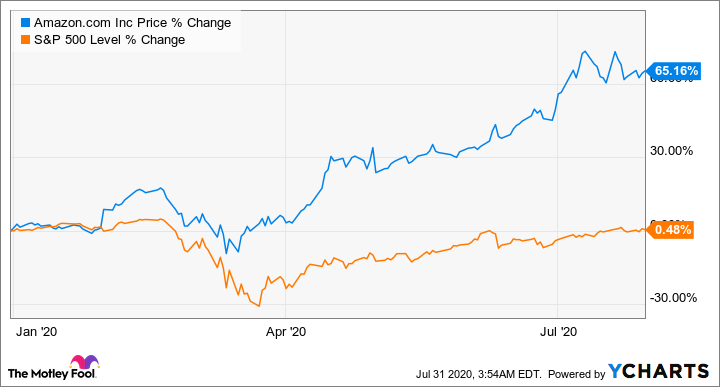
Convenience
It is needless to mention how busy people are generally. The eCommerce stores help them get their daily needs fulfilled without disrupting their schedule. Just a few taps on the mobile screen, and you can have the products delivered to your doorstep. This inherent convenience is the first thing that people mention while talking about the benefits of eCommerce. And reputed eCommerce companies go the extra mile to keep up with the delivery expectations of their customers. Sometimes, they offer expedited services just to be in their good books.
Now that you are aware of the reasons for the surge in eCommerce sales, let us give you an idea about the biggest online retailers leading the global eCommerce industry. The following eCommerce companies list will not only give you the names but also the reasons for being on the top.
List of Companies Making It Big In eCommerce
1. Amazon
Oh well, who doesn’t know THEM? Is there anyone who has never shopped from this eCommerce giant here? Rarely! This is the company that people all around the world trust almost blindly with their daily needs. In 2020, the eCommerce giant managed to gain a whopping $21.33 billion in revenue in the US alone.
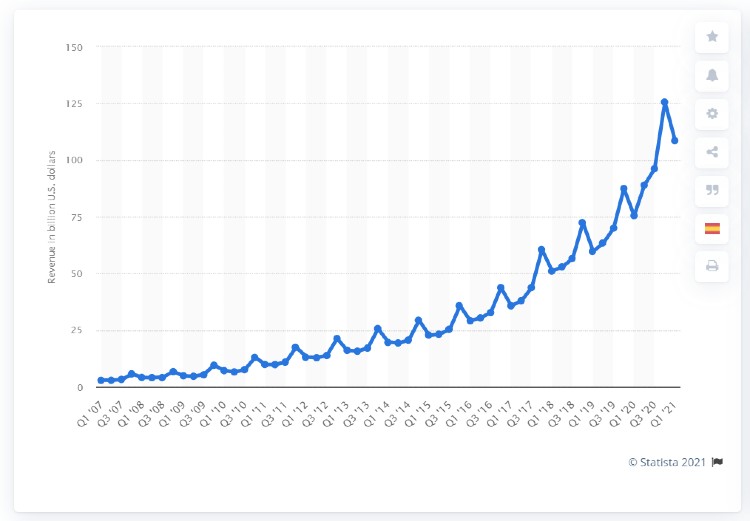
Currently, Amazon serves 14 countries with over 5 million employees. Initially an online bookseller, Amazon garnered immense popularity over the years to become the go-to store for everything online. Customers are not wrong when they say that if it is not on Amazon, it is nowhere. With its user-friendly website, mobile app, and exceptional customer services, the eCommerce giant has won the hearts of millions across the globe.
But, what are their secrets to success?
Well, Amazon has developed 90+ bespoke brands to sell on their platform, while other eCommerce companies have mostly acquired established brands. That is why their products are inherently cost-effective, another reason for their popularity in developing countries, besides the US. The eCommerce giant also uses customer data to identify and analyze their demands and expectations. The platform always seeks to offer tailored experiences to the customers, depending on their requirements.
2. Walmart
Walmart or Wal-Mart Stores Inc is not only the biggest retailer but also the largest private employer and one of the top eCommerce companies across the globe. According to the Fortune 500 list of 2020, it is also the largest company with $548.743 billion in revenue. In the pandemic, its sales rose by 79% due to its fast-tracked, convenient pickup approaches. Its online business surged by 97% during the critical times of the COVID-19 pandemic. Take a look at the steady growth of its eCommerce revenue from the first quarter of 2020 to present in the graph below.
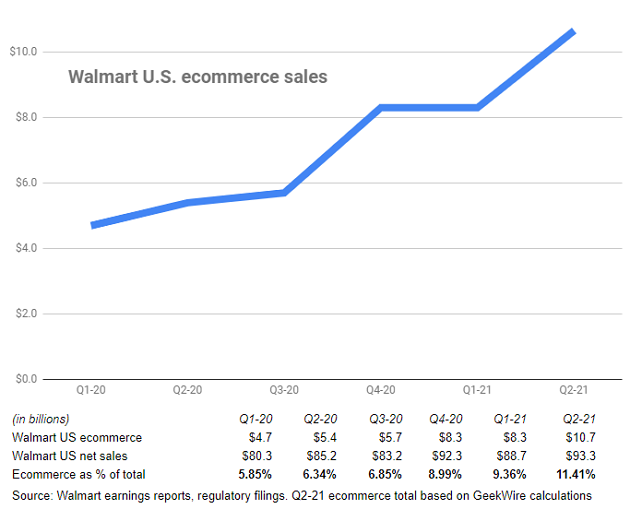
As the work culture shifted homewards and offices were established in homes, people turned to the eCommerce giant for home-office equipment and children’s study materials, besides other needs of the hour. It also expanded its marketplace to meet the changing demands of its customer base in the US. The grocery sector itself witnessed a 12.3% surge in sales as per a report by Forbes. One of the other big reasons for its popularity is its extreme responsiveness and agility. Besides meeting the pandemic crisis, the company made it big because of its aggressive acquisition approaches. In the last few years, it has acquired a series of eCommerce brands, like Modcloth, Shoes.com, Jet.com, etc., to stand up against its biggest competitor, Amazon.
3. Alibaba
Also known as the Amazon of China, Alibaba is, undoubtedly, one of the largest eCommerce companies in Asia, and the world at large. Although core commerce accounts for about 80% of its revenue, it is set to change in the following few years. With an average revenue of $5.6 billion and more than 50,000 employees in 12 countries, Alibaba has been making its mark in the digital shopping industry for quite some time now.

Its dominance in the world’s most populous country has been one of the primary reasons for its immense popularity, giving stiff competition to its peers, like Amazon, Apple, and Alphabet. Besides meeting regular customer demands, Alibaba also ventures into online gaming and cloud computing to keep up with the changing digital sphere. Like Amazon Pay and PayPal, Alibaba also has its own payment service, AliPay, that helps in building its integrity. In the future years, the company plans to scale up and join the largest eCommerce companies list in western countries.
4. eBay
In the first quarter of 2020, the multinational marketplace garnered a revenue of $2.4 billion with an impressive COVID-19 response team and subsequent changes in business approaches. It also donated $3 million to charities and NGOs across the globe and partnered with the Department for Health and Social Care and the National Health Service in the UK to supply protective equipment to the frontline workers. The number of global active buyers went up by 2%, probably because of a new feature, ‘Image Clean-Up’ that enhanced the Google shopping experience for the customers.
However, the business was doing well even before the pandemic, as shown in the graph below:

This eCommerce giant first started as an online flea market where people sold their used products to others. But today, more than 80% of its products are brand new, making eBay one of the most successful marketplaces online. It also invested in Flipkart, another eCommerce giant in the East in 2017, while the latter took control over its operations. It is also the owner of StubHub, ticket exchange and resale venture in the US.
5. JD.com
Previously known as 360buy, JD.com INC is a Chinese eCommerce company that has its headquarters in Beijing. Jingdong or JD is also a member of the Fortune Global 500 list and gives stiff competition to Tmall, the Alibaba-run B2C online retail store. Its online retail venture was started in 2004, shortly after the company was founded in 1998. In 2020, the Chinese eCommerce giant garnered a profit of US$ 114.3 billion, despite the odd circumstances.
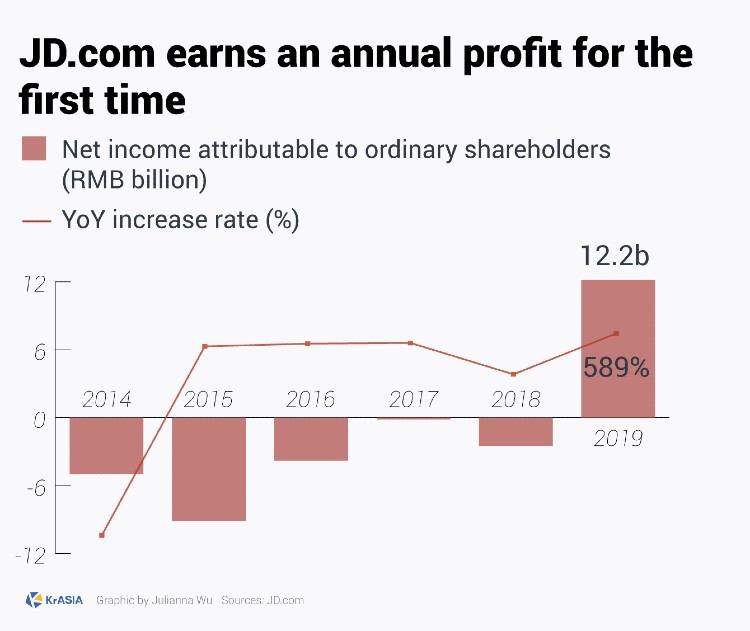
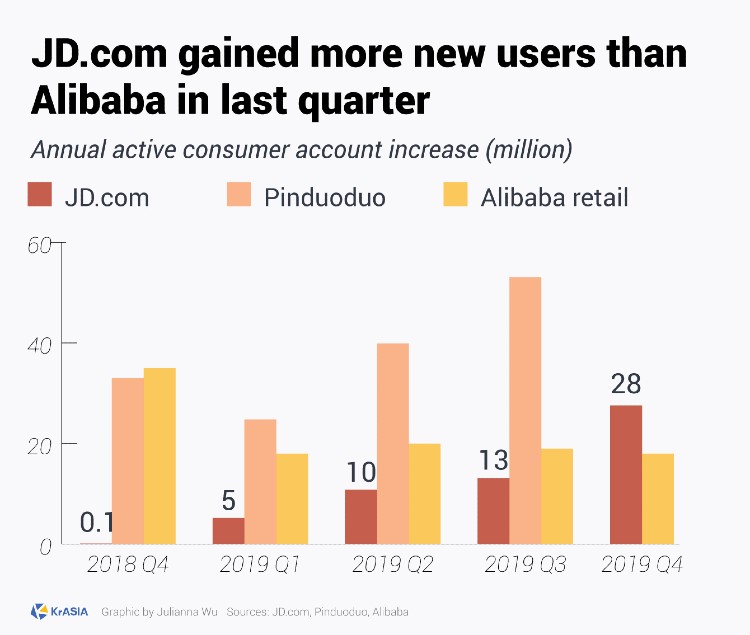
Its high popularity in the retail field is mainly because of its fast adoption of tech and AI-based customer services. The company has been investing extensively in drones and robots to up the delivery experience. In fact, it has the largest drone delivery system across the globe. Of late, it has also started building drone airports and robotic delivery systems.
6. Rakuten
The ‘Amazon of Japan’, Rakuten has an average annual revenue of $3.9 billion with nearly 15,000 employees serving in 6 countries. About 90% of people in Japan use this website to shop for their daily requisites. Besides being a top eCommerce company, it also sponsors the jerseys of Spanish football club FC Barcelona and the Golden State Warriors NBA.
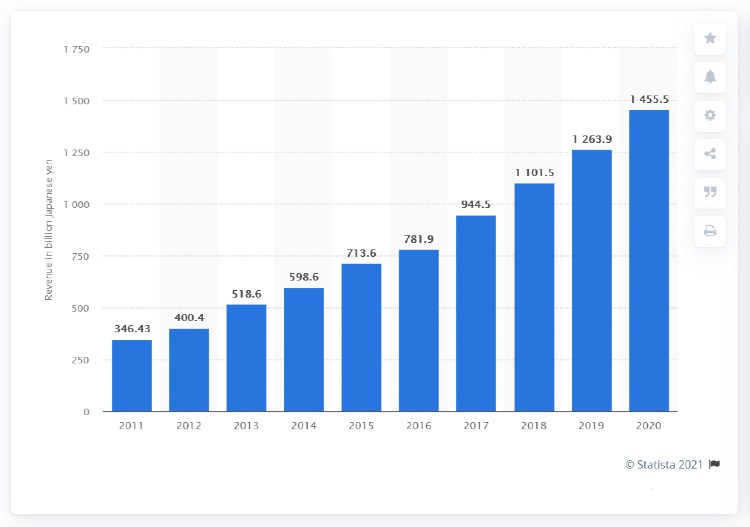
One of the biggest reasons for its popularity is its aggressive acquisition policy. Rakuten has acquired several companies, like Buy.com, Wuaki. tv, etc. It also acquired BitNet, a Bitcoin payment system in 2016 and is planning to venture into other fields in the coming years.
7. Flipkart
Walmart-owned Flipkart undoubtedly makes to the list of the largest eCommerce companies in India with annual average revenue of $15.5 billion and 30,000 employees. In the pandemic year 2020, its revenue grew by 12% and losses dropped by 18% due to panic buying and extensive customer services that met the changing demands.
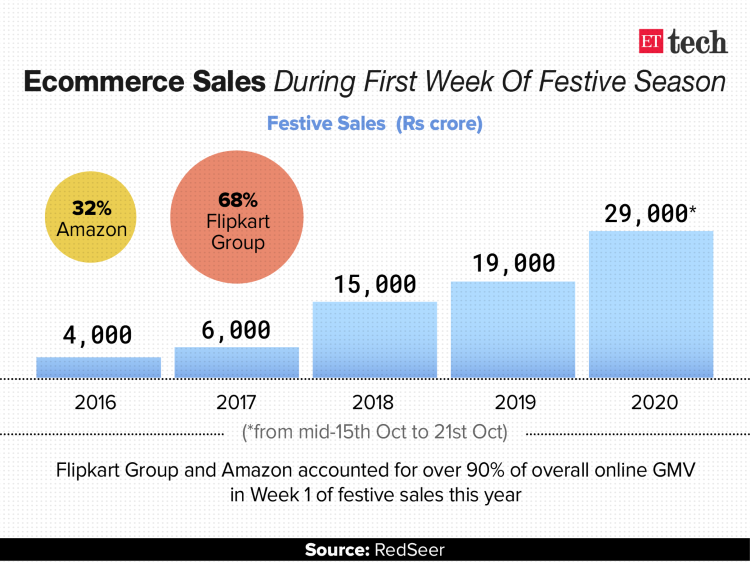
You will be surprised to know that the Indian eCommerce giant was founded by some former Amazon employees in 2007. It was also the first-ever Indian online retailer, whose mobile app exceeded 50 million downloads. Its customer service policy is unmatched, and the company also updates its platform from time to time to remove fraudulent sellers and low-quality products.
One thing that you will notice is common among all the largest eCommerce companies across the globe is their consistent growth even during the pandemic. Most of these companies have adapted to the changing circumstances to provide their customers with nothing, but the best. However, even the eCommerce startups and small-scale niche companies are gaining traction these days, owing to active social media participation and exceptional customer services. Before we end this discussion, let us give you an idea about some of the upcoming trends in the eCommerce industry.
eCommerce trends that will dominate in the coming years
Independent retailers will rise in popularity
The entrepreneurship approach in eCommerce is set to dominate the market in the coming years. Customers will be keener to buy from like-minded businesses people, preferably with common cultural and social backgrounds. For example, businesses owned by colored people became quite popular last year. More purpose-driven eCommerce companies will make their mark in the industry.
AR and VR will take the front seat
Improving the shopping experience for customers has always been at the top of every eCommerce company’s priority list. In the coming days, this trend will get bigger with the incorporation of tech, especially in the form of Augmented Reality (AR) and Virtual Reality (VR). Retailers will work to make the shopping experience more fun and close-to-reality, interactive, and seamless with the help of the latest tech innovations.
Increased customization and on-site personalization
On-site personalization will be prioritized by the online retailers in the following days. People will get the chance to customize their product and purchase experiences to make the best buying decisions. Browsing and buying behavior will be tracked by tools embedded on the website to increase the sales possibilities. More seamless ways to pay for online purchases will also be taken into consideration by the smallest to the largest eCommerce companies.
Social commerce
Social media will continue playing a pivotal role in eCommerce in the coming days. However, the social media giants will scale up their eCommerce ventures to stay ahead in the competition. Brands will take to prominent platforms more and understand their importance in creating buzz for their products/services. Popular social media giants, like Instagram and Facebook, also plan to integrate direct purchases from their platforms.
On-site storytelling
Last but not least, content on eCommerce platforms will take a storytelling approach, be it product descriptions, reviews, or explainer videos. These will help improve buying behavior and convert more visitors. Descriptive content in the form of interactive videos, reviews of real people who you can reach out to, and voice content will be incorporated by the biggest eCommerce companies, as well as the startups. This enhanced storytelling approach will get more people to buy new products, as it will build trust and loyalty with the brand.